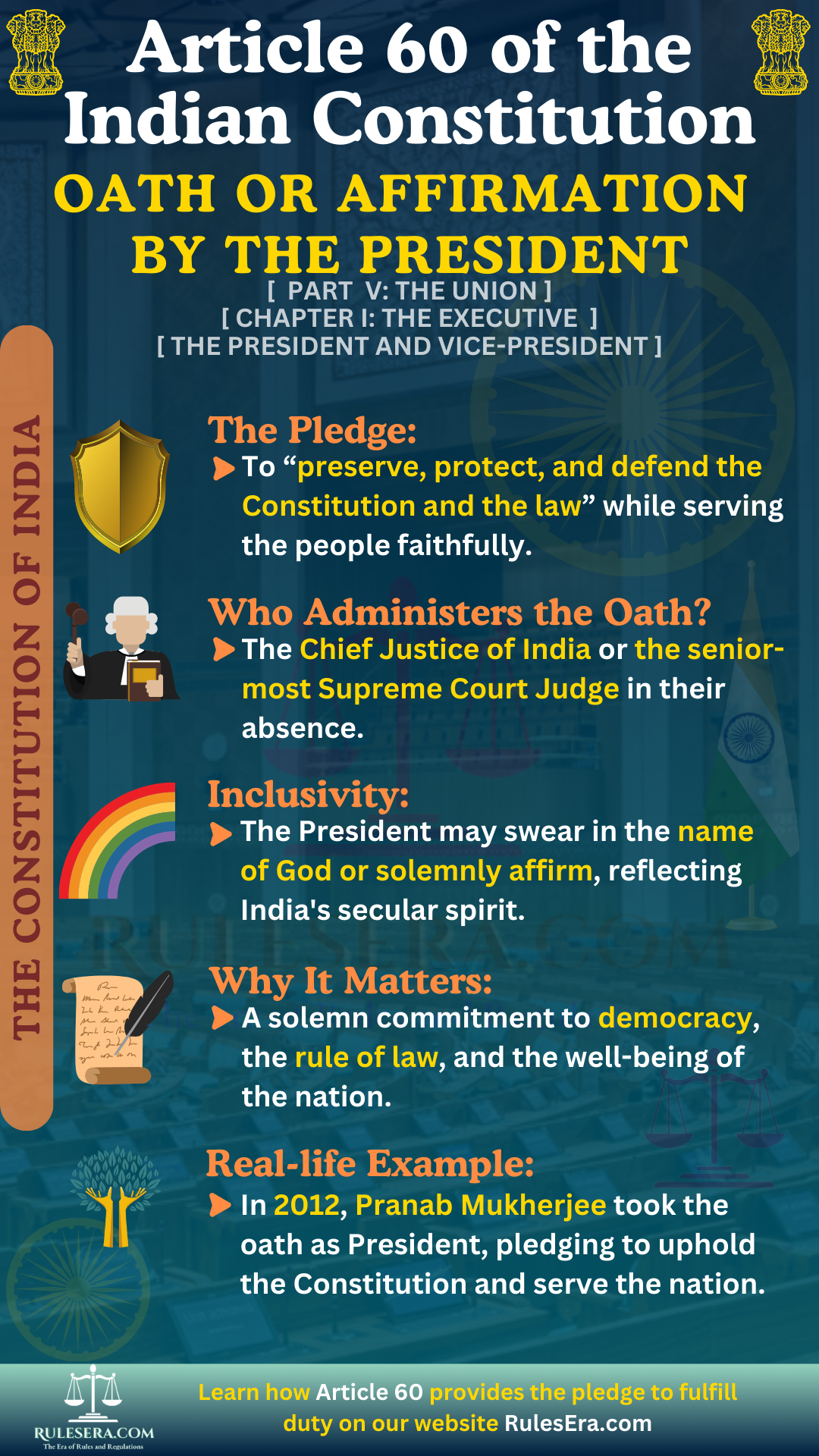Part V: The Union
Chapter I: The Executive
Article 60: Oath or Affirmation by the President

--- Original Article ---
Every President and every person acting as President or discharging the functions of the President shall, before entering upon his office, make and subscribe in the presence of the Chief Justice of India or, in his absence, the senior-most Judge of the Supreme Court available, an oath or affirmation in the following form, that is to say—
"I, A.B., do swear in the name of God / solemnly affirm that I will faithfully execute the office of President (or discharge the functions of the President) of India and will to the best of my ability preserve, protect and defend the Constitution and the law and that I will devote myself to the service and well-being of the people of India."
Explanation
Article 60 of the Constitution of India outlines the formal process for the oath or affirmation that the President must undertake before assuming office. This oath signifies the President's commitment to preserving the Constitution, upholding the law, and serving the people of India with dedication.
Key Provisions
- Requirement for Oath or Affirmation: Article 60 mandates that every elected President or acting President must take an oath or affirmation in the presence of the Chief Justice of India or, in their absence, the senior-most judge of the Supreme Court.
- Content of the Oath: The President pledges to "preserve, protect, and defend" the Constitution and the laws of India and commits to faithfully serve the people of India.
- Religious Sensitivity: The oath provides an option to either swear in the name of God or make a secular affirmation, respecting the individual's personal belief system and reflecting the secular nature of India’s Constitution.
Amendments and Real-Life Examples
- Amendments: While Article 60 has not undergone amendments, its role is crucial in emphasizing the President’s duty to uphold the Constitution. Judicial interpretations have further clarified the President’s obligation to act within the constitutional framework.
- Real-Life Example: When Pranab Mukherjee was sworn in as the President of India in 2012, he took the oath in the presence of the Chief Justice of India, symbolizing the formal beginning of his term and his commitment to the constitutional duties.
- Acting Presidents: In 1977, Vice President B. D. Jatti assumed the office of Acting President following the death of President Fakhruddin Ali Ahmed. Jatti had to take the oath of office, reiterating that even temporary holders of the office must uphold the constitutional oath.
Historical Significance
The oath or affirmation by the President symbolizes the importance of the Constitution as the supreme law of the land. By committing to preserve, protect, and defend it, the President ensures the democratic and constitutional framework of India remains intact. This tradition, rooted in the practice of parliamentary democracies, highlights the President's role as a guardian of the Constitution and a servant of the people.
Legislative History
Article 60, initially debated as Article 50 of the draft Constitution, underwent substantive discussions before being adopted in its current form in the Constitution of India.
Debates and Deliberations
During the Constituent Assembly debates on Article 50 (now Article 60), several key amendments were proposed. Shri T. T. Krishnamachari introduced an amendment to allow the senior-most judge of the Supreme Court to administer the oath in the absence of the Chief Justice of India. This amendment was accepted without opposition.
Shri Mahavir Tyagi, building on a proposal by Shri H. V. Kamath, suggested allowing the President to swear in the name of God or make a secular affirmation. This amendment aimed to respect individual beliefs, ensuring that the President could choose between a religious or secular oath, reflecting the secular nature of the state.
Dr. B. R. Ambedkar endorsed this change, acknowledging the importance of providing moral sanction for the President's obligations while allowing freedom of belief. He noted that the inclusion of "God" in the oath did not affect the state's secular character but offered personal assurance for those who believed in divine obligation.
Ultimately, the amendments were adopted, and Article 60 was included in the Constitution, ensuring that every President would take an oath to faithfully execute their duties in line with constitutional values and personal beliefs.
Frequently Asked Questions (FAQs):
The Chief Justice of India administers the oath to the President of India. In the absence of the Chief Justice, the senior-most judge of the Supreme Court administers the oath.
Yes, the President can choose to either swear in the name of God or make a secular affirmation, depending on personal beliefs. This reflects India's commitment to respecting individual religious freedoms.
Yes, anyone acting as President or discharging the functions of the President must take the oath or affirmation, even if their role is temporary.